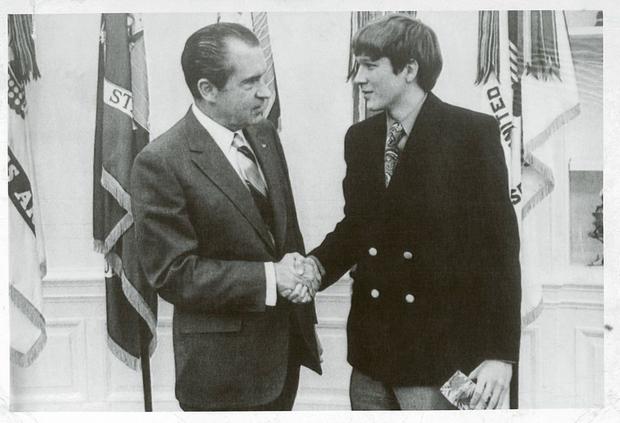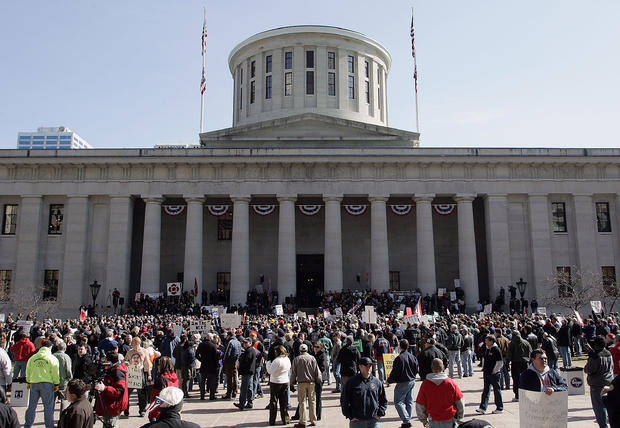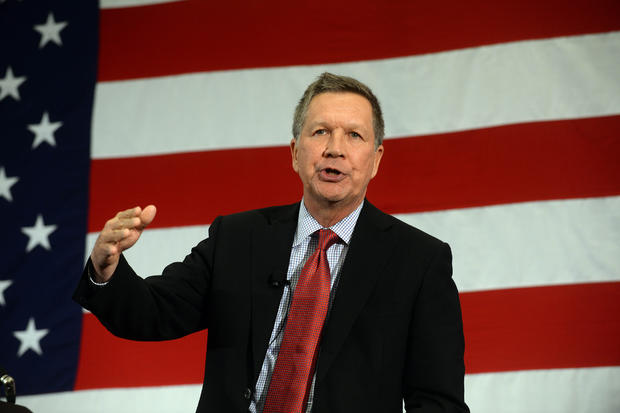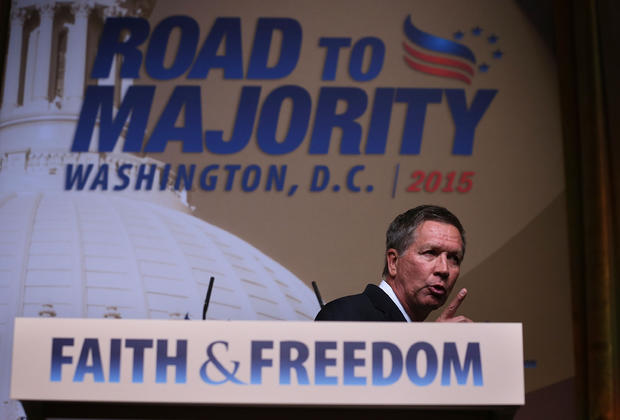Five things to know about John Kasich
John Kasich enters a crowded field of Republican candidates Tuesday, as he becomes the 16th person to declare he is running for president.
It will be an uphill climb for the Ohio governor, who's in the three percent range in national polls. But he does bring three distinct advantages to the race: he'll be the most popular sitting governor running, with a 60-percent approval rating in his state, a June Quinnipiac poll says, a presidential operation with more than $11 million in the bank, and a long resume that includes nearly 20 years in Congress, the statehouse in Ohio and time in the private sector.
Kasich's shot at moving up in the polls may come if one of his opponents starts sinking. He's a business-friendly governor that will appeal to the same crowd as former Florida Gov. Jeb Bush and New Jersey Gov. Chris Christie. Plus, he has Christie's brash style that appeals to some voters, but with a better state economic record to back up his leadership.
"Republican voters do like the style that Chris Christie made famous back in 2012, the style of where you just don't take criticism sitting down," Ohio State University Political Science Professor Paul Beck told CBS News. "Kasich may be able to differentiate himself from Bush within that same niche as being more like Chris Christie and less like Jeb Bush."
Click through to learn five things to know about John Kasich.
He’s late to the 2016 race – but not to politics
While Kasich could be the last Republican to enter the presidential race (former Virginia Gov. Jim Gilmore has said he'll join, too), he's by no means a latecomer to the political world. In 1970, while a freshman in college, Kasich asked the president of Ohio State University to deliver a handwritten letter to former President Nixon during a meeting in Washington. The letter was later found by the Dayton Daily News.
"I would immediately pass up a Rose Bowl trip to see you. My parents would permit me to fly down and see you anytime and I know my grades wouldn't suffer," Kasich wrote. "I know how busy you are and this is probably a ridiculous request but to me it would be a dream come true."
Mr. Nixon wrote back that he would welcome a visit at the White House, and Kasich took him up on the offer three weeks later. They met for about 20 minutes.
From there, his political career took off. Here are some things Kasich has been doing since that 1970 letter:
- 1974: Graduated from Ohio State University
- 1978-1982: Served as a Democrat in the Ohio Senate
- 1983-2001: Elected to the House of Representatives as a Republican. Chaired the House Budget Committee, where fought with former President Clinton over the budget. He also helped oversee Mr. Clinton's impeachment proceedings.
- 2000: Ran for president, but lost to former President George W. Bush in the primary
- 2001-2008: Managing Director in Lehman Brothers' Investment Banking Division
- 2011-present: Governor of Ohio
He’s in his second term as Ohio governor
Had Kasich's first term gone as planned, he might have become the union-busting president before Wisconsin Gov. Scott Walker did.
In 2011, he championed legislation that would have limited the collective bargaining rights of 350,000 public workers, including teachers, police and firefighters. The backlash was intense, and union forces managed to secure a referendum vote on the law. Voters rejected it, dealing a blow to Kasich and sending his approval rating into the low 30-percent range.
But he took the defeat graciously, saying he respected the decision of the voters, and he turned his attention to other budget issues like cutting income taxes and rebuilding the state's rainy day fund (it rose from 89 cents when he took office to more than $2 billion today).
"He has really not gone back to try to do anything more or be supportive of anything more in terms of attacks on unions," Beck said.
Kasich's approval rating rose, and today he's one of the most popular governors in the nation. He was re-elected in 2014 with a whopping 64 percent of the vote, though that was partially due to the collapse of Democratic candidate Ed FitzGerald.
He’s a budget hawk
Kasich's reputation as a budget hawk began during his days as the House Budget Committee chairman. He rose to the position - already famous for his co-sponsoring an amendment that killed the Pentagon's request to build B-2 stealth bombers. He spent his early years in Congress writing budgets that made swift and deep cuts to the federal budget. Then-House Speaker Newt Gingrich credited him as the person most responsible for writing the 1997 Balanced Budget Act, a bipartisan agreement during the Clinton administration to balance the budget by 2002, the last time the federal budget was balanced.
He brought that budget fervor to Ohio, where law requires that the state budget be balanced. Despite facing a nearly $8 billion shortfall when he took office, Kasich's first two budgets ultimately produced surpluses and helped replenish the rainy day fund.
In the lead-up to his presidential campaign, he created a nonprofit group called Balanced Budget Forever to advocate for adding a balanced budget amendment to the Constitution.
He’s broken with his party on key issues
Although many Republican governors refused to expand Medicaid in their states, lest it be seen as supporting Obamacare, Kasich took the opposite tack. He expanded the low-income health care program, which required him to bypass the Republican-led legislature in Ohio.
But Kasich has defended the move. When a donor questioned the decision at a retreat sponsored by billionaire conservatives Charles and David Koch, Kasich angrily responded, "The governor's response was fiery. "I don't know about you, lady," he said as he pointed at the donor, according to Politico. "But when I get to the pearly gates, I'm going to have an answer for what I've done for the poor."
He's also refused to abandon his support for Common Core educational standards, and has gone so far as to suggest his fellow Republicans' opposition is motivated by potential political gain rather than facts.
"He's kind of a maverick - not in the [Arizona Sen.] John McCain sense, perhaps, but he is somebody who really operates on what I would call conservative principles, but defines conservative principles sometimes differently than other conservatives do," Beck said.
He’s Protestant
Kasich was born Catholic, the son of a mailman, but he converted to Protestantism after both of his parents were killed in a car crash involving a drunk driver in 1987.
As evidenced by the fact that he has invoked St. Peter when discussing the Medicaid expansion, Kasich isn't shy about connecting his faith to his legislating, but he doesn't preach in the way that former pastor and former Arkansas Governor Mike Huckabee does. Kasich's social conservative credentials could help him if the more overtly religious candidates drop out of the race.
"Conservative Christians are going to favor other candidates over him, but the question is once we get to the primaries and caucuses will those other candidates be around?" Beck said. "If not I think that group of voters - and they're a significant share of the Republican base - that group of voters is going to begin rethinking who they support and Kasich could look OK in that respect."



